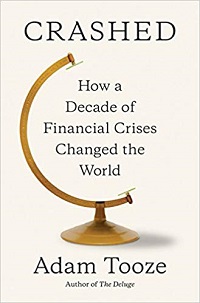Crashed: How a Decade of Financial Crises Changed the World. Adam Tooze.
Allen Lane. 2017. 706 pages.
2016 was the year traditional allegiances scrambled, on both sides of the Pond. The year Brexit and the election of Donald Trump shook the foundations of conventional politics, famously causing Angela Merkel to declare “Europe must take its destiny into its own hands.”
 But the genesis of these shocks goes rather deeper, as some pointed out at the time. Instead of asking why 2016 became ‘the year of populist revolt’, as we often do, the question should perhaps be whether we would have been surprised to witness them eight years earlier, in 2008. After all, would a political overhaul have been surprising in the wake of the financial crisis?
But the genesis of these shocks goes rather deeper, as some pointed out at the time. Instead of asking why 2016 became ‘the year of populist revolt’, as we often do, the question should perhaps be whether we would have been surprised to witness them eight years earlier, in 2008. After all, would a political overhaul have been surprising in the wake of the financial crisis?
As Adam Tooze demonstrates with forensic detail in his new book, Crashed, the political upheaval of the last few years is in fact inextricably linked to the economic turmoil that preceded it.
Tooze, a Columbia professor with personal roots in the Britain, the U.S., and mainland Europe, pulls no punches. He argues that, although the crisis had its proximate causes in the American economy, its upheavals soon radiated outwards. “To view the 2008 crisis and its aftermath chiefly through its impact on America,” he writes, “is to fundamentally misunderstand and underestimate its economic and historical significance … The Eurozone crisis is not a separate and distinct event but follows directly from the shock of 2008.”
Eurosceptics looking for red meat will find unflattering accounts of Germany shirking the responsibilities of de facto Eurozone leadership. Tooze writes scathingly of how German reticence about debt mutualisation across the Eurozone nearly collapsed the entire project. The eventual support given indirectly to Greece by the European Central Bank – courtesy of the unwitting German taxpayer – can be seen both as evidence of European institutions’ mission creep and of the ever-closer union necessitated by the relentless logic of the euro.
In another section we see how Ukraine, begging for relief from billions of dollars of economic damage from sanctions on trade with Russia, was offered a paltry €610 million (yes, million) by the EU. Less than a week later, Vladimir Putin stepped into the gap armed with a $15 billion loan, and the ensuing tug of war over Ukraine led to the Crimea crisis and beyond.
As Tooze freely admits, the Crashed philosophy is decidedly Keynesian. Readers looking for philosophical justifications of public spending cuts should head elsewhere. Tooze does not pretend to be anything other than viscerally opposed to the changes wrought by the Coalition, writing that “Britain became a darker, dirtier, more dangerous and less civilised place.”
Here, Tooze omits the inconvenient fact that UK crime rates fell every successive year from 2011 to 2017, resulting in a rate less than half that of a decade previously. How Britain actually became “darker, dirtier and less civilised” is left for the reader to imagine.
But the central economic question the book examines is what countries should do when afflicted both by high deficits and a high national debt. According to normal Keynesian theory, they should increase public spending to boost aggregate demands in times of downturn and bring spending under control when the economy is doing well and use that money to pay down the debt. But when countries are trapped between creditors and public services, the theory becomes less clear-cut.
Unfortunately, Tooze’s only suggested solution is debt restructuring: allowing countries with high debt burdens to simply renegotiate down the amount that they owe. In the particular case of Ireland, which decided to offer unlimited – and therefore enormously expensive – guarantees to its entire banking system during the crisis, Tooze argues that the principle of honouring government debts should come second to the real-world impacts of repaying debt on a country’s citizens.
After all, he argues, “if Ireland were to continue to honour the entire debt burden of its banks, owed in large part to foreign investors, the impact would be harrowing.” Similarly, he argues that Greece was crying out for restructuring when it entered rounds of successive bailout negotiations with the rest of the Eurozone.
However, Tooze writes that Greece’s cardinal sin was not to borrow too much during the early Noughties, “but the debts built up in the 1980s and 1990s, when modern Greek democracy had been established on the back of a huge surge in government spending and expensive borrowing.” This meant that when unemployment rose during the crisis, the Greek state proved unable to support the increased burdens placed on it.
With UK debt levels still well in excess of 80 per cent of GDP, it is not unreasonable to ask whether our public finances are in good enough shape to survive another downturn. Given the challenge of Corbynism and suggestions of an end to austerity, the UK’s commitment to fiscal discipline seems to be slipping. But as for the answers to these questions, we will just have to wait and see.
This review originally appeared at the Institute of Economic Affairs' blog and is reprinted with permission.
(Photo credit: Jorge Royan. This photo has been cropped. CC BY-SA 3.0.)



